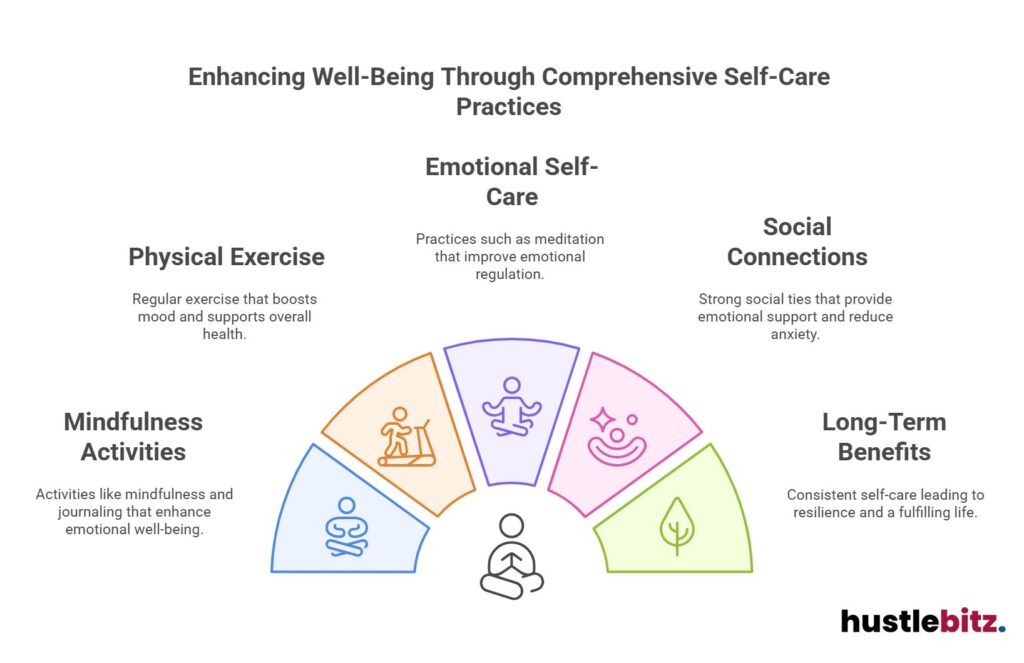Self-maintenance practices significantly enhance mental health by promoting emotional well-being and resilience. Engaging in self-care activities, such as mindfulness, journaling, and maintaining a balanced routine, can lead to reduced anxiety and improved mood. Furthermore, a strong connection exists between physical health and mental wellness; regular exercise and nutritious diets stimulate brain function and elevate mood. Enhancing emotional regulation through self-care fosters coping skills, ultimately building resilience. Prioritizing self-maintenance not only provides immediate stress relief but also contributes to long-term mental stability and enhanced self-esteem. To uncover additional insights into self-maintenance, explore further.
Key Takeaways
- Self-maintenance activities, like mindfulness and journaling, enhance emotional well-being, reducing anxiety and improving mood.
- Regular physical exercise boosts mood through endorphin release, supporting both mental and physical health.
- Emotional self-care practices, such as meditation, promote better emotional regulation and coping skills.
- Strong social connections provide essential emotional support, contributing to lower anxiety and improved mental well-being.
- Consistent self-care leads to long-term benefits, including increased resilience, improved emotional regulation, and a more fulfilling life.

Understanding Self-Maintenance

Self-maintenance encompasses a range of intentional activities aimed at preserving and enhancing one’s mental, emotional, and physical well-being. Central to this concept is self-care for mental health, which emphasizes the necessity of engaging in practices that promote emotional well-being. The importance of self-care cannot be overstated; it serves as a foundation for maintaining mental health and well-being in the face of everyday stressors and challenges.
Engaging in self-care activities can lead to significant benefits, including reduced anxiety, improved mood, and increased resilience against life’s demands. Such practices may include mindfulness, journaling, and establishing a balanced routine, all of which contribute to emotional stability. Furthermore, prioritizing time for oneself fosters a deeper understanding of personal needs and enhances self-awareness, allowing individuals to respond more effectively to emotional fluctuations.
The benefits of self-care extend beyond the individual; when people prioritize their mental health, they often experience better relationships and increased productivity. This ripple effect reinforces the notion that self-care is not a selfish endeavor, but rather a vital practice that enables individuals to contribute positively to their communities and support others.
Physical Health and Mental Well-Being
A strong connection exists between physical health and mental well-being, as engaging in regular physical activity and maintaining a balanced diet can significantly enhance emotional stability and resilience. This relationship underscores the importance of self-care practices that not only focus on mental health but also prioritize physical health for overall wellness.
Research indicates that individuals who incorporate exercise into their daily routines experience reduced symptoms of anxiety and depression. Physical activity stimulates the release of endorphins, which are natural mood lifters. Additionally, a nutritious diet rich in vitamins and minerals supports brain function, further contributing to emotional well-being.
The following table illustrates the benefits of physical health on mental well-being:
| Aspect | Benefit |
| Regular Exercise | Boosts mood, reduces anxiety |
| Balanced Nutrition | Enhances cognitive function |
| Adequate Sleep | Improves emotional resilience |
| Hydration | Supports mental clarity and focus |
Incorporating these elements into a self-care routine not only fosters physical health but also strengthens mental health. As individuals invest time in nurturing their bodies, they often find that their emotional well-being improves, leading to a more balanced and fulfilling life. Prioritizing self-care in both physical and mental domains is essential for achieving and maintaining overall health, ultimately paving the way for a more resilient and thriving existence.
Emotional Regulation Through Self-Maintenance

Effectively managing emotions is crucial for maintaining mental health, and self-maintenance practices play a significant role in achieving this balance.
Emotional self-care involves recognizing and nurturing our emotional needs, which ultimately contributes to improved mental health and self-care. Practicing self-care is important not only for physical well-being but also for emotional stability.
To enhance emotional regulation through self-maintenance, consider the following self-care activities:
- Mindfulness and Meditation: Engaging in mindfulness practices helps individuals become more aware of their emotions and reactions, allowing them to respond thoughtfully rather than impulsively.
- Journaling: Writing about your feelings can provide clarity and insight, enabling you to process emotions and reflect on your experiences. This practice can serve as a powerful tool for emotional self-care.
- Social Connections: Building and maintaining healthy relationships provides emotional support and fosters a sense of belonging. Engaging with friends or family can act as a buffer against stress and enhance emotional resilience.
Incorporating these self-care activities into your routine can significantly improve emotional regulation. By prioritizing emotional self-care, you not only bolster your mental health but also equip yourself with the skills needed to navigate life’s challenges.
Building Resilience and Coping Skills
Recognizing the importance of emotional regulation sets the stage for understanding how building resilience and coping skills can further enhance mental health.
Effective self-care means taking time to nurture both your emotional and physical needs, which can significantly contribute to your overall mental well-being. Developing resilience involves learning how to bounce back from challenges and maintain a positive outlook despite adversity.
One of the most powerful self-care practices is engaging in activities that promote relaxation and mindfulness, such as meditation or yoga. These activities not only improve your health but also equip you with coping skills that are essential during stressful times.
When faced with difficulties, individuals with strong coping skills can better manage their emotions and thoughts, thus reducing the impact of stressors on their mental health.
Additionally, fostering a support network of friends, family, or professionals can provide the necessary encouragement and understanding, reinforcing resilience.
Regularly engaging in self-care practices, such as exercise, journaling, or pursuing hobbies, can also serve as proactive measures to bolster your coping skills.
Enhancing Self-Esteem and Confidence

Enhancing self-esteem and confidence is essential for overall mental well-being, as these attributes empower individuals to face challenges with a positive mindset and a sense of self-worth.
Self-care means taking proactive steps to nurture one’s emotional health, which directly contributes to improving your mental health and fostering positive mental health.
A fundamental aspect of enhancing self-esteem involves engaging in activities that affirm your worth. Consider the following strategies:
- Set Achievable Goals: Establish small, realistic objectives that you can accomplish. Celebrating these achievements, no matter how minor, reinforces a sense of competence and success.
- Practice Positive Self-Talk: Challenge negative thoughts about yourself. Replace them with affirming statements that recognize your strengths and contributions. This shift in mindset can significantly boost your confidence.
- Engage in Self-Care: Prioritize activities that rejuvenate your mind and body. Whether it’s exercise, hobbies, or mindfulness practices, dedicating time to self-care means taking an active role in your mental health and wellness.
Stress Reduction Techniques

Implementing stress reduction techniques is crucial for maintaining mental health, as they provide individuals with effective tools to manage daily pressures and promote overall well-being. Engaging in a self-care routine not only helps to reduce stress but also fosters resilience against the challenges of everyday life. The importance of self-care cannot be overstated; it serves as a foundational practice that supports mental and emotional health.
Various self-care techniques can be incorporated into daily life to promote relaxation and alleviate tension. Mindfulness meditation, for instance, encourages individuals to focus on the present moment, allowing them to detach from stressors and cultivate a sense of inner peace. Similarly, physical activities such as yoga or aerobic exercises are proven to release endorphins, which are natural mood lifters that significantly reduce stress levels.
Additionally, maintaining a balanced diet and ensuring adequate sleep are vital self-care practices that contribute to overall mental health benefits. Nutrition directly influences mood and energy levels, while proper rest is essential for cognitive function and emotional stability.
Furthermore, social connections play a pivotal role in stress reduction; engaging with friends and family can provide emotional support and foster a sense of belonging.
Long-Term Benefits of Self-Maintenance

The consistent practice of self-maintenance not only aids in immediate stress relief but also fosters significant long-term benefits for mental health, enhancing overall resilience and emotional stability over time.
Understanding the importance of self-care for mental health is crucial, as it lays the foundation for lasting well-being. Self-care means taking the time to engage in activities that nurture our emotional and psychological needs, ultimately contributing to a healthier mindset.
Here are three key long-term benefits of a dedicated self-care routine:
- Improved Emotional Regulation: Regular self-maintenance helps individuals develop better coping mechanisms, allowing them to manage their emotions effectively during challenging times. This leads to fewer emotional crises and greater stability.
- Increased Resilience: By consistently prioritizing self-care, individuals build a reservoir of positive experiences and skills that bolster their ability to bounce back from adversity. This fosters a sense of empowerment and confidence in dealing with future challenges.
- Enhanced Overall Well-Being: Engaging in self-care activities contributes to physical health as well, creating a holistic approach to well-being. When mental health is prioritized, individuals often experience improvements in their physical health, leading to a more balanced life.
Final Thoughts
Incorporating self-maintenance practices into your daily life is essential for enhancing mental health and overall well-being. By engaging in activities such as mindfulness, regular exercise, and maintaining a balanced routine, you can significantly reduce stress, improve emotional regulation, and build resilience. The benefits of self-maintenance extend beyond immediate relief, offering long-term advantages such as enhanced self-esteem, increased confidence, and greater emotional stability. Prioritizing self-care is not just about managing daily stressors—it’s about creating a sustainable foundation for a healthier, more fulfilling life. As you continue on your journey of self-care, remember that the small, consistent steps you take today can lead to profound improvements in your mental and physical health over time.




